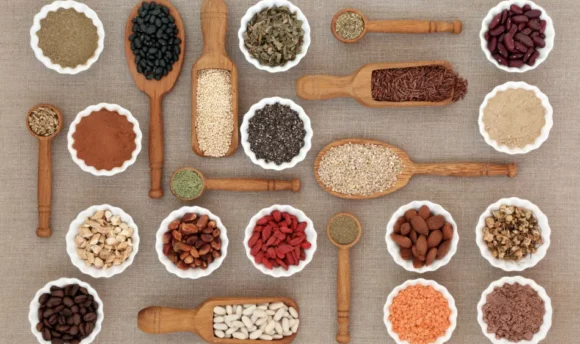How to Slow Down Metabolism to Gain Weight
7 science-backed ways to slow down your metabolism. Tips on nutrition and exercise to gain and maintain weight.

No matter how much you eat and train, you don’t seem to gain weight or muscle.
Being skinny can be a problem even though society doesn’t regard it as much. And a fast metabolism is the one to blame.
A fast metabolism in skinny people might cause constant stomach upset, headaches, and fatigue. There are even more serious problems related to it, such as low blood sugar, malnutrition, infertility, and a compromised immune system.
If you’re trying to gain muscle and weight and regulate your energy expenditure, here’s how to slow your metabolism.
We’re going to show you 7 effective ways to both nutrition and regular exercise without undermining your health.
How to Slow Down Your Metabolism? 7 Science-Backed Ways
Nutrition and exercise are two elements we can modify to change our metabolic rate. Here are all the steps to slow down your metabolism:
#1 Count calories
Your primary goal to slow down your metabolism is to eat more calories than your body needs throughout the day.
You start by knowing how many calories you need to eat daily for weight maintenance. Counting calories ensures you stay in a calorie surplus.
Try to get that same number of calories every day and check the scale every two weeks. Be disciplined and plan your meals to ensure you follow your weight gain plan. To gain a pound in a week, consume a surplus of 3,500 calories. That means you have to take 500 calories extra every day.
#2 Boost your appetite
Even though slowing your metabolism doesn’t require calorie restriction, this might be hard for many people due to the lack of appetite. Low appetite depends massively on the level of hormones and if you are getting enough sleep.
Your levels of leptin, the appetite suppressor, might be too high, or ghrelin levels, the hormone of appetite, might be too low.
Three micronutrients that can serve as appetite boosters are zinc, vitamin B1, and fish oil. They may help regulate the levels of leptin and ghrelin. Also, you can take an appetite booster supplement that includes a variety of ingredients like the ones mentioned, plus protein and fiber.
#3 Eat more carbs
Even though carbs have fewer calories per gram than fats, carbs are a greater weight stabilizer. Make sure a third of your plate is whole-grain carbs.
In addition, carb consumption increases hunger and cravings and promotes weight gain. Slow-carbs, like whole-wheat grains, take more time to digest, and they provide long-lasting energy.
#4 Add extra treats to the meals
Think of all the treats you like having and add them to your diet. Eat peanut butter with your cornflakes, or prepare a banana and peanut butter snack.
Since you’ll be eating more, don’t forget to leave a wide window for eating. This way, your stomach will have plenty of time between snacks to digest the food and turn it into glucose for use and fat to be stored.
Also, research shows that eating at night time will lead to weight gain. So, keep that in mind when you feel like skipping dinner.
#5 Take a high-calorie supplement
A high-calorie protein supplement helps you get plenty of calories in and fuels your body to respond to the changes. Don’t use the supplement as a food replacer; rather, take it between meals to not cut your appetite.
Weight gain protein supplements are convenient because you can take them with you during a walk or while you work. You can even add it to your coffee.
Be careful with certain appetite repressor supplements such as glutamine, which increases the calorie-burning rate in the body.
#6 Eat more often
First, you should have at least 3 full meals each day. An effective tactic to gain weight and slow your metabolism is eating breakfast early and not skipping meals, especially dinner.
Between meals, try to consume snacks that are high in calories. Pay attention to the quality of nutrition these snacks have as well. Try to keep it clean, because you want to gain a healthy weight, but you should also avoid other health problems such as digestive or heart problems.
A study conducted on athletes wanting to gain weight shows that fewer meals increase the fat mass in the body disproportionally. They also create gastrointestinal problems.
All in all, you have to have energy-balanced meals that impede undesired weight loss.
#7 Try strength training
Another reason your metabolism is fast might be because you’re over-training and burning too many calories during your workouts.
This happens especially if you’re only doing high-intensity cardio: by burning more calories than you consume, your body will undermine your weight gain journey.
Strength training is the best workout to slow down your metabolism.
Strength training burns fewer calories, but it tires your body to need more fuel. You’ll gain your appetite, and because you’ll want to perform better, you will eat more and avoid skipping meals.
Can Metabolism Slow Down?
The main factors that can cause a slow metabolism are hormones, genes, strict diets, sleep deprivation, and health conditions.
Nutrition and exercise might lead to your body slowing down your metabolic rate. For example, if you’ve been on a calorie restriction for a long time, your body is used to conserving energy, thus, increasing its basal metabolic rate (BMR).
The environment temperature can also slow down your metabolism. When you’re in a too cold or too hot environment, your body uses extra energy to equilibrate the body temperature.
Does Fast Metabolism Go Away?
Yes, fast metabolism goes away with age.
As we grow older, we burn fewer calories and decrease the energy needed. By knowing our genetics, age, and muscle percentage, we can change our basal metabolic rate.
Recent research shows that at 20–60 years old, humans have a stable metabolic rate, but after the age of 60 and further, metabolism slows down significantly.
Also, specific health problems regarding antibiotics and high-stress levels slow the metabolism down.
Is My Metabolism Too Fast?
Your metabolism is fast if you have one of these signs. Number one is difficulty in putting or maintaining weight.
Another sign of people with a fast metabolism is high body temperature. If people keep telling you about the warmth of your body, that shows that your body is working nonstop and spending more energy than most people.
People with fast metabolisms also have an appetite and frequently go to the bathroom. They might urinate frequently and have 2–4 bowel movements per day.
Foods to Slow Down Metabolism
Eating junk food and table sugar is not the proper way to deal with your slow metabolic rate. Try to eat nutrient-dense and high-calorie foods.
Some foods you should eat more often include whole grains and legumes. Pasta, brown rice, bulgur, lentils, chickpeas, and beans are some carbs that should make up for a third of your plate.
Also, choose lean meats as your protein source. Chicken, red meat, and steak are great choices. Seafood products are also an excellent choice to fuel your muscles and keep you satiated for longer.
Dairy and animal products like eggs and varieties of cheese may also help slow down your metabolism. Lastly, avocado, olive oil, nuts, and other healthy fats are digested easily and turned into fuel rather than as stored fat.
A Word From RD
Your metabolic rate isn’t eternally fixed, so you can do many things to change it. A fast metabolic rate might keep some people underweight or make it difficult to manage body weight.
To change your BMR, add nutrient-dense foods such as refined carbs, lean protein, and healthy fats. Eat bigger portions of carbohydrates and try to stop skipping meals.
Do not overtrain your body and opt for strength training. High-intensity cardio will speed up your metabolism and burn more calories. So, for a slower metabolism, opt for strength training which builds muscle mass.
Taking appetite-boosting supplements will help you regulate your hunger and fuel your body adequately. Stay consistent in your efforts, and, most importantly, consume in a calorie surplus.
Conclusion
If you’re trying to gain weight and muscle mass, but your metabolic rate is holding you from achieving that, you should have the proper strategy to break the cycle. With a slow metabolic rate, you burn fewer calories and start gaining weight.
Start by having a calorie surplus of 500 calories every day. Eat at least 3 meals per day with added snacks you enjoy. Do strength training and leave behind high-intensity cardio to stop your weight loss. Strength training burns calories at a lower rate than other workouts.
Don’t expect changes quickly. It will take time to get used to the new energy consumption, burn fewer calories, and stop weight loss. In the meantime, stay at a comfortable temperature, especially when you sleep.

















































 Select your language:
Select your language: 








